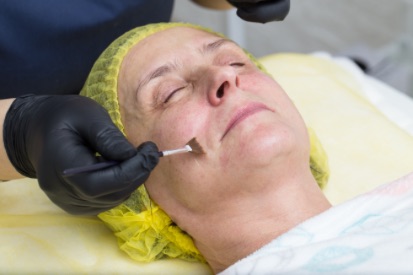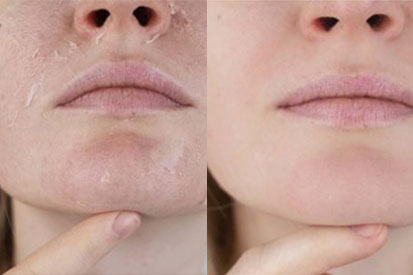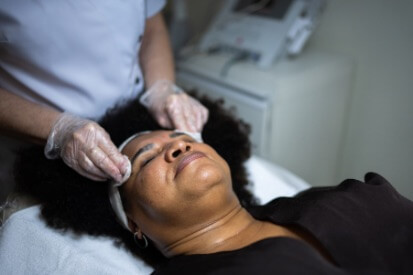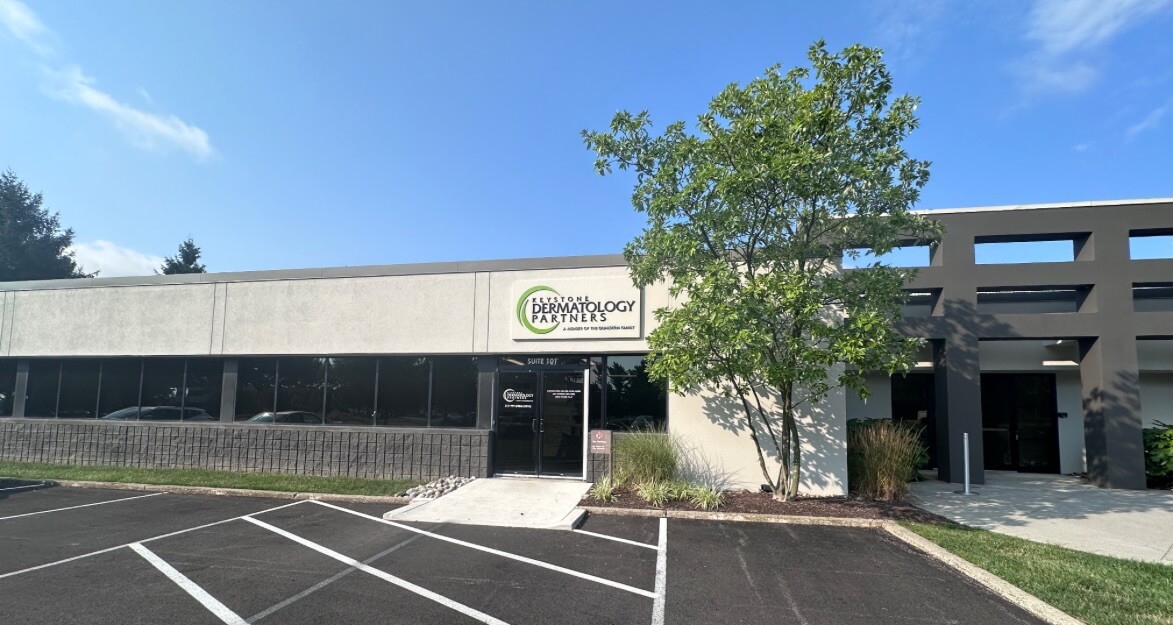Chemical Peels
Get Ready to Glow with Chemical Peels at Keystone Dermatology Partners
One of the best ways to address signs of aging is a chemical peel at Keystone Dermatology Partners in Philadelphia. This treatment uses a chemical solution to exfoliate dead and damaged skin cells, resulting in smoother skin that looks younger and more refreshed.
How Chemical Peels Work:
Typically, a specialized chemical solution, featuring powerful ingredients like alpha hydroxy acids (AHAs), beta hydroxy acids (BHAs), or trichloroacetic acid (TCA), is applied to your skin. This carefully formulated mix works by gently peeling away the outer layer of skin, revealing a smoother, fresher layer underneath.
Chemical peels are versatile and come in different intensities to suit your skin’s needs, from a light refresh to a deeper rejuvenation. There's a peel option for everyone, whether you're after a subtle enhancement or a more dramatic renewal.
And the benefits don’t stop there—chemical peels do more than just revitalize your appearance. They help promote skin renewal, remove dead skin cells, and boost collagen production, leaving your complexion smoother, firmer, and more radiant. Say goodbye to fine lines, wrinkles, and uneven skin tone, and welcome the youthful, glowing skin you've always wanted.
At Keystone Dermatology Partners, we offer expert chemical peels to help you achieve your skin goals. Schedule a consultation today and get ready to reveal your best, most vibrant self!
Chemical Peel Examples



Why Does Our Skin Show Signs of Aging?
- Overexposure to harmful UV rays.
- Exposure to pollution and harsh weather.
- Poor skin nutrition and improper treatment of the skin.
- Stress-causing hormone fluctuations resulting from pregnancy or menopause.
Benefits of Chemical Peels:
- Removes dead skin cells to reveal a smoother, brighter complexion.
- Diminishes the appearance of fine lines and wrinkles.
- Helps fade dark spots, sun damage, and acne scars for a more even skin tone.
- Stimulates collagen, improving skin elasticity and firmness.
How Does a Chemical Peel Work?
The chemical solution that is applied to the skin induces peeling, hence the name. This then reveals a newer, fresher, younger, and more vibrant skin layer.
Who Is in Need of a Chemical Peel?
Patients with fresh scars or wounds are advised to wait until these injuries have completely healed. Those who regularly drink or smoke too much will get the most out of this treatment if they cut down on or quit the habit entirely.
Types of Chemical Peels
Additionally, each peel strength is fit for different skin types. For example, a person with sensitive skin using a strong chemical peel would experience further skin damage, so a lighter peel would be a better option.
There are three main types of chemical peels:
Superficial Peel – Also called a lunchtime peel, this option typically uses alpha-hydroxy acid or another mild acid. The chemical solution penetrates into the outer layer of the skin and leaves the inner layers intact. It gently exfoliates the skin and improves the appearance of rough texture and mild discoloration. It is suitable for all skin types and can be used to refresh the face, neck, hands, and chest.
Medium Peel – This type of chemical peel uses glycolic acid or trichloroacetic acid (TCA) to penetrate the outer and middle layers of the skin. The treatment is ideal for smoothing away rough patches. It is also used to treat precancerous skin growths. The medium peel helps to improve the appearance of fine lines, wrinkles, age spots, freckles, and moderate skin discoloration.
Deep Peel – This type of chemical peel uses phenol or trichloroacetic acid to penetrate deep into the skin layers and is used only on the face. The treatment removes damaged skin cells and treats moderate wrinkles, age spots, freckles, and shallow scars. The results of this treatment are dramatic, and it can be used only once. Anesthesia is required for the treatment session.
FAQs for Chemical Peels
Absolutely, chemical peels can be paired with other cosmetic treatments, such as laser therapy or injectables, to create a more tailored and effective skincare regimen. This combination allows for enhanced results, addressing multiple skin concerns simultaneously, and providing a more comprehensive rejuvenation.
Adhere to the post-care guidelines given by your skincare professional. This generally involves gentle cleansing, regular moisturizing, and diligent sun protection to enhance and preserve your results. Additionally, avoiding harsh products and exfoliation is crucial for proper healing and long-lasting effects.
Chemical peels are an effective solution for various skin issues, such as fine lines, wrinkles, acne scars, uneven pigmentation, and sun damage. The peel's type and intensity will be customized to meet your individual skin needs.
Depending on the peel’s type and strength, you may feel some discomfort. Most people feel a tingling or warming sensation. Recovery time also differs; lighter peels usually have little to no downtime, while deeper peels may cause redness and peeling for a few days. Your dermatology provider will explain what to expect based on the specific peel you select.
Chemical peels are a versatile treatment option that can address various skin issues, such as fine lines, wrinkles, acne scars, uneven pigmentation, and sun damage. The peel's type and intensity will be customized to meet your individual skin care objectives.
From Our QualDerm Family of Brands: Get Glowing Skin
How Keystone Dermatology Can Help: Chemical Peels in Philadelphia
Speak with your provider at Keystone Dermatology Partners to discover the best options for your skin and how we can create a personalized treatment plan to achieve your healthy skin goals.
Schedule your chemical peel appointment today and take the first step toward a brighter, healthier complexion.
Featured Blogs

- General Dermatology
- Skin Care
Dermatologists are noticing a trend between protein supplements and acne flares. This blog explores protein alternatives that won't worsen your acne.
Read More
- General Dermatology
- Skin Care
Read this blog to explore the connection between chocolate consumption and acne.
Read More
- Skin Cancer
- General Dermatology
- Skin Exams
Navigating the landscape of Total Body Skin Exams: Uncover the comprehensive process, understand why it matters for skin health, and gain insights into what to expect during these essential dermatological examinations.
Read More

